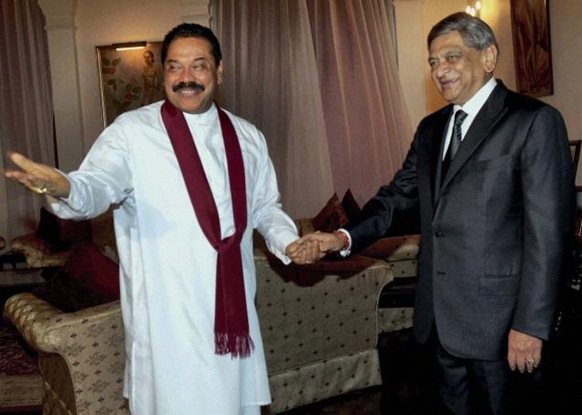 External Affairs Minister S.M. Krishna, on a four-day visit to Sri Lanka, said on Friday India hoped for the creation of a ‘structured dialogue mechanism’ to work out a political solution to the ethnic conflict in the island nation.
External Affairs Minister S.M. Krishna, on a four-day visit to Sri Lanka, said on Friday India hoped for the creation of a ‘structured dialogue mechanism’ to work out a political solution to the ethnic conflict in the island nation.
Talking to journalists here after an Indo-Sri Lanka Joint Commission meeting, which he presided over along with his Sri Lankan counterpart, G.L. Peiris, said the end of the armed conflict in May last provided a historic opportunity for addressing all outstanding issues and moving towards a political settlement in the spirit of understanding and mutual accommodation.
It is for the first time that India has publicly articulated its desire for a planned mechanism to carry forward the dialogue in the quest for resolution of the ethnic conflict.
Hours after a breakfast meeting Mr. Krishna had with President Mahinda Rajapaksa and the seventh session of the Indo-Sri Lanka Joint Commission, it was announced that Mr. Rajapaksa had a ‘landmark’ interaction with representatives of the Tamil Parties Forum (TPF).
The TPF is an umbrella outfit of Tamil groups other than the Tamil National Alliance (TNA). The TNA, which won a majority of the seats to Parliament in the April general election, in recent weeks has veered round to the view that a political solution to the ethnic conflict has to be within a united Sri Lanka.
To a question on the perceived delay in devolution of powers to provinces and redress of grievances of minorities, Mr. Peiris, who was present at the press conference, said the immediate priority was humanitarian issues in the post-conflict era and maintained that the government was engaged in pursuing long-term goals.
The Minister said suggestions were invited from all stakeholders to the ethnic problem and the government was engaged in dialogue with various political groups.
Both Ministers agreed that the just-concluded Joint Commission covered the whole range of issues of interest and took the bilateral relations to a new level.
Mr. Krishna said the scheduled opening of the Indian consulates in Hambantota and Jaffna was a significant milestone in promotion of people-to-people contacts.
On the commitment by India to build 50,000 houses for the war-displaced Tamils in the Northern and Eastern provinces, he said it would be an enduring symbol of India-Sri Lanka partnership. The Joint Commission had ratified the instrument on transfer of prisoners and mutual legal assistance treaty
Mr. Krishna said India was helping Sri Lanka in providing relief to and resettlement of nearly 3 lakh Tamil civilians and war-displaced Tamils.
To a question, he said Tamil Nadu Chief Minister M. Karunanidhi had conveyed some concerns over resettlement of the war-displaced Tamils, and the Sri Lanka government was sensitive to those concerns. The remaining displaced civilians — about 18,000 refugees continue in the relief camps — would be resettled by December-end.
Fishermen issue
Mr. Krishna said the October 2008 understanding arrived at between the two countries had a salutary effect on the incidence of arrests of fishermen and on their safety and both sides had agreed that the Joint Working Group on Fishing should meet soon.
“To build on the vibrant and multifaceted partnership between our two countries, it is important that we leverage our common strategic interests, further enhance connectivity and economic engagement, and promote people-to-people contacts. The opening of our Consulates in Hambantota and Jaffna is a significant milestone in this quest. In this connection, we also expect to resume ferry services between Colombo and Tuticorin and Talaimannar and Rameswaram soon, an agreement on which has been finalised,” the Minister said.
Earlier, a $416-million Credit Agreement for construction of the Northern Railway line was signed in the presence of President Rajapaksa and Mr. Krishna.
Letters exchanged
In addition, letters were exchanged between Treasury Secretary P.B. Jayasundara and Indian High Commissioner Ashok Kantha for the first phase of the project to build 50,000 houses, for the IDPs, funded by India. Initially 1,000 houses would be constructed in a cluster format on land given by the Sri Lanka government. It was decided that Kapilawasthu relics would be brought from India next May for the 2,600th Sambudda Jayanthi celebrations.
(For updates you can share with your friends, follow TNN on Facebook and Twitter )
